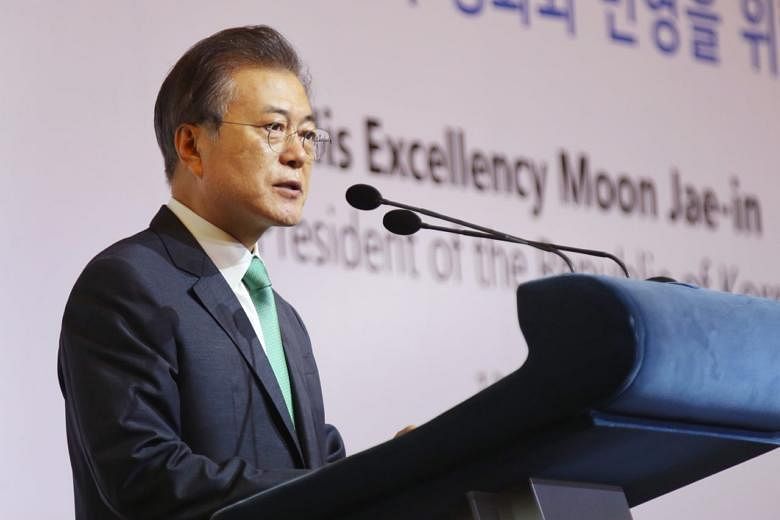SINGAPORE - Asean can continue to play a constructive role in helping to usher in peace and stability on the Korean peninsula, said South Korean President Moon Jae-in on Friday (July 13).
"It is necessary to create opportunities for North Korea to fulfil its role as a responsible member of the international community," he said in the highlight lecture of his state visit to Singapore, which ends on Friday.
"In the event North Korea carries out measures for denuclearisation with sincerity, I hope that the North will be invited to the various consultative bodies run by Asean, and that bilateral exchanges and cooperation between Asean and the North will be strengthened."
Mr Moon outlined how the regional grouping could help resolve the nuclear issue and bring about a deeply-rooted peace on the Korean Peninsula in his lecture, titled "Republic of Korea and Asean: Partners for achieving peace and co-prosperity in East Asia".
The event, held at the Orchard Hotel, was part of the Singapore Lecture series in which world leaders give their readings on global and regional affairs.
Mr Moon cited several Asean efforts so far which have kept North Korea in the fold of the international community.
For instance, since 2000, Asean has supplied a venue for dialogue between North Korea and the international community - the Asean Regional Forum (ARF).
The ARF is the only multilateral forum North Korea takes part in and it has been a vital channel of communication between North Korea and the international community, said Mr Moon.
Asean has also consistently encouraged the North to give up its nuclear missile development programmes and choose the path towards peace and prosperity, he added.
Mr Moon said Asean and North Korea also had a mutually beneficial economic relationship before international sanctions were ramped up against North Korea in response to its nuclear programme.
The regional grouping also supported economic cooperation between the two Koreas by allowing goods produced in their jointly-run Kaesong Industrial Complex to fall under the same tariff rates applied to South Korean goods under the Korea-Asean Free Trade Agreement, he added.
"When international sanctions against the North are lifted, once North Korea carries out complete denuclearisation, the once-vibrant economic cooperation between North Korea and Asean will be revived again," he said.
Road map to peace
In his speech, Mr Moon laid out his envisioned road map towards peace on the Korean Peninsula, which involves the United States, Japan, China and Russia as well.
Following the two historic summits between North and South Korea in April and May this year, South Korea will draw up a new economic map and both Koreas will press on towards an economic community, he said.
Turning to Korea's neighbours, Mr Moon said that the normalisation of inter-Korea relations will eventually normalise North Korea's relations with the US and then with Japan.
Japan and China's leaders have said they would actively support the implementation of the Panmunjom Declaration adopted at the inter-Korea summit in April, he noted.
Russia and South Korea have also agreed to cooperate with each other, and with North Korea, he added.
Mr Moon acknowledged that the path to peace would not be easy, but said that if the summit agreements are implemented with sincerity, the goal can be achieved.
"If North Korea gives more substance on the implementation of denuclearisation, and if South Korea and the US quickly take comprehensive corresponding measures, the whole process will accelerate," he said.
Later, during the question and answer session, Mr Moon acknowledged that working-level talks between North Korea and the US would not all be smooth sailing.
He described their agreement, reached during US President Donald Trump and North Korean leader Kim Jong Un's meeting in Singapore in June, as a direct swop of North Korea's complete denuclearisation for US security guarantees to the regime and the ending of their hostile relationship.
President Moon said the countries will continue to face many challenges as their working-level officials meet to map out a detailed denuclearisation plan, but that they will eventually reach an agreement.
"There will be some difficulties at the working level to achieve the swop, especially the question of what comes first. I'm aware it is a difficult process," said Mr Moon.
But, he said: "The two leaders met directly and made a promise to the international community. This is why I believe it's a completely different approach compared to the past.
"I believe even if there are some bumps and bruises in the negotiations along the way, these agreements will be adhered to in the end."
"If they do not keep the promise made by their leaders in front of the international community, they will have to face repercussions from the international community," he added.


